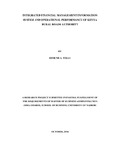| dc.description.abstract | Procurement in public sector plays a vital role in the economy of the third world countries and was estimated to account for 9-13 percent of the gross domestic product. However, much consideration should be focused on the procurement since many of its resources are poorly managed among different countries. Over the past years, the government of Kenya has embarked on various public financial management reforms with the goal of enhancing liability and transparency as well as support in the fiscal discipline achievements, efficiency and strategic allocation as well as funds utilization, monetary value and profitability in the public funds usage. Integrated financial management information system was introduced to assist the government in effectively leveraging old and new technology to improve the pace of reforms and management of cash and this became a vital target for the budgets of countries agenda to reform which is normally considered as a prerequisite for management effectiveness in achieving resources of budgets. However, despite a number of researches having reported optimistic findings with performance improvement by the financial systems found in public sector, there are still hurdles in the major economic areas and there have also been drawbacks reported by most scholars in the system’s full functionality. The major goal of this research was to scrutinize the role of IFMIS on operational performance of Kenya Rural Roads Authority. Technology acceptance model together with task-technology fit theory was the foundation of the study. The study adopted case research design. The target population of this study was the departments of the KeRRA set-up. A census survey was followed and data collection was done through a questionnaire. The study reported a response rate of 70 percent. The study relied on descriptive statistics and inferential statistics in the analysis of the collected data. The study discovered that stock and monitoring, transparency and fiscal information have strong significant influence in determining operations performance and that the major challenge facing the implementation of IFMIS system was that some key activities at KeRRA were still being undertaken outside the system. The study therefore recommends that guideline on best practices should be embraced to ensure full implementation and functioning of IFMIS system. | en_US |



